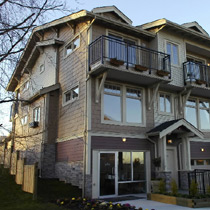No price too high as purchasers raid their RRSPs, borrow from family, Re/Max says
Derrick Penner
Sun

A decade or so ago, buyers expected to own a house like their parents’, Ash said in an interview. Now in Vancouver, almost every other property sold has been a condominium. Vancouver Sun files
First-time home buyers in the Lower Mainland continue to raid RRSPs, borrow money from family and take on mortgages that will take longer to pay off just to get into the property market, Re/Max reported Tuesday.
In its latest affordability report, the national realtor noted first-time buyers are still jumping into the market in the face of double-digit price increases and rising unaffordability, mostly by buying condominiums.
“Purchasers simply refuse to be priced out of the market, even though household income has not kept pace with housing appreciation,” Elton Ash, Re/Max’s western vice-president said in a news release.
A decade or so ago, buyers expected to own a house like their parents’, Ash said in an interview. Now in Vancouver, almost every other property sold has been a condominium.
“Suites have always been a large factor in Vancouver, and I think the news here [is] the compromises,” Ash said. “People are willing to look at smaller homes or condos to get into the market.”
The Re/Max report is a survey of its realtors in 13 cities across the country, which found condominiums to be a more popular choice for housing in markets where prices have gone up most, such as Edmonton, Calgary, Saskatoon and Kelowna.
Buyers have been inventive in their financing, such as signing mortgages with longer amortization periods and lower monthly payments.
Ash said some buyers are taking on mortgages without downpayments, though that practice is limited by strict qualification criteria.
Some wealth is starting to be transferred from baby boomers to their children as the leading-edge of that group reaches retirement age between 2008 and 2013.
“That’s the reason why we’re pretty confident with how the market is going to continue to perform in the near term,” Ash said.
However, the help doesn’t mean buying into the market is getting easier.
Diane Luu, a realtor at Legend Coronet Realty in Vancouver said first-time buyers largely accept that the prices they see on the Multiple Listing Services are the prices they have to pay.
Some of her clients have used help from parents on their downpayments, others have swung the purchases on their own.
“To be honest though, first-time purchasers do struggle,” Luu said. “They’re overwhelmed with the costs that come along with the purchase that they’re not aware of [such as] property transfer taxes, mortgage fees and all the other details.”
To date, however, her first-time clients have been happy with the equity gains they’ve seen in their properties a year after they’ve bought.
Aaron Best, Luu’s colleague at Legend Coronet added that the first-time buyers he’s worked with have experienced some frustration with prices and with the lack of quality on the market.
“Especially since January, the good product [sells] right away,” he said. “Everybody’s looking for the same product, the prices are already high and they have to over-bid. There’s general frustration with that as well.”
The Royal Bank, in its latest housing affordability index, found the standard Vancouver condominium, priced at $273,313, had become slightly less affordable in the last quarter of 2006 consuming 35.4 per cent of the average household income to cover mortgage, taxes insurance and other property costs.
That compares with 35.2 per cent in the previous quarter.
The qualifying income to buy that condominium, assuming a 25-per-cent downpayment was, $60,444.
The standard Vancouver bungalow worth $541,889, on the other hand, became a bit more affordable consuming 68.5 per cent of the average family income in the last quarter of 2006 compared with 70 per cent in the previous quarter.
The qualifying income to buy that house, with a 25-per-cent downpayment, was $117,172.
Julie Jaggernath, education coordinator for the Credit Counselling Society said her non-profit agency is hearing from an increasing number of people who have felt pressured to jump into the real estate market and are winding up with credit problems.
“The ‘want it now, get it now’ philosophy: That has become a challenge,” Jaggernath said.
However, Jaggernath added that bankruptcy numbers are down because so many people are working.
“[They are] able to look at repaying their debts so they’re not having to declare bankruptcy.”
CONDOS OPEN DOORS TO FIRST-TIMERS
Yes, it’s possible for some first-time buyers to get into the Vancouver housing market, especially if they opt for a condo rather than the house/yard/ white picket fence dream of their parents. Consider these recent affordability comparisons from RBC Economics
Affordability in Greater Vancouver, Q4 2006
STANDARD CONDO
Average price: $273,313
Qualifying income: $60,444
*Affordability measure: 35.4
DETACHED BUNGALOW
Average price: $541,889
Qualifying income: $117,172
*Affordability measure: 68.5
Source: RBC Economics
